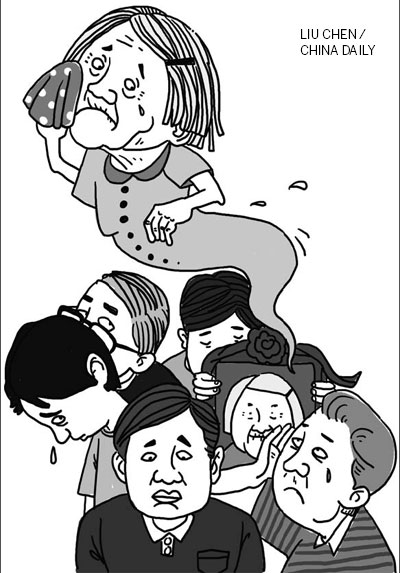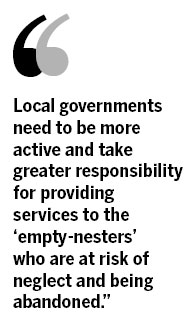Family values under threat
By Jenelle Whittaker (China Daily)
Updated: 2010-05-18 09:52
 |
Large Medium Small |

Chinese media reported on May 12 that the three sons of an elderly woman who was found starved to death in April last year have appealed against their prison sentences.
The three were found guilty of abandonment in Tongzhou court, southeast of Beijing, and sentenced to between two and three years in prison.
They were charged under the law on elder rights protection passed in 1996, which stipulates that children must provide financial security, daily necessities and emotional stability to their parents in their old age. The law is being revised.
According to the autopsy, the 80-year-old was found between 10 and 15 days after she died.
It is shameful that it took that long for someone to notice something was wrong and even more concerning that it was not one of her sons who bothered to drop by.
The tragedy started in 2007 when the woman broke her leg and there was a dispute over who should pay the medical bills. It was then agreed that the sons would take care of her on a rotation basis, with each taking care of her for a three-month period. The son who was scheduled to care for her when she died received the longest sentence.
This was an extreme example of the decline in filial piety but may be a sign of what is to come. The assumption that children will look after their parents in their old age, like the law suggests, is unrealistic and will worsen as the population ages.
Labor migration, the one-child policy and changes in mainstream values, have led to a change in family structure, making it increasingly hard to support ageing parents.
Property and health care disputes are not uncommon because middle-aged Chinese residents find it increasingly difficult to support themselves, let alone their parents and grandparents.

During the next few years, the problem is only going to get worse when the first generation of the one-child policy offspring hit their 30s. The 4-2-1 inverted pyramid problem, where one child cares for two parents and four grandparents, could potentially lead to ageism, neglect and abandonment.
According to official figures from the China National Committee on Ageing, nearly 80 million people aged 60 and older live in "empty nests" with no children to care for them. This accounts for 49.8 percent of seniors.
Increasingly, elderly citizens are living alone. In urban areas, it is no longer normal for three generations to live under one roof.
With a rapidly ageing population, by 2050, the number of Chinese older than 60 years is expected to double to 24 percent. There needs to be adequate assistance for the "empty-nesters" who can't rely on their children for help.
In January 2009, the central government announced the 964 policy as a solution to the ageing population. This policy aims to build a community-based care system to ensure 96 percent of elderly citizens receive the care they need at home and in communities while the remaining four percent live in nursing homes.
The community-based care system - also called ageing-in-place services - falls on each local community government to implement.
Local governments need to be more active and take greater responsibility for providing services to the "empty-nesters" who are at risk of neglect and being abandoned.
If the majority of Chinese senior citizens are to receive services in their homes where many live without family, there needs to be a strong support network and regular visits to avoid the horrible fate of dying alone and being left to rot.
China's long culture of family values is in danger.